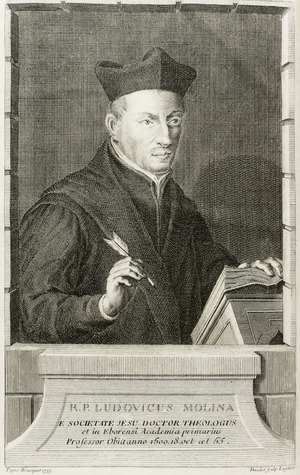Luis de Molina facts for kids
Quick facts for kids
Luis de Molina
|
|
|---|---|

Portrait of Luis de Molina
|
|
| Born | September 29, 1535 |
| Died | October 12, 1600 (aged 65) |
| Alma mater | University of Salamanca |
| Era | 16th-century philosophy Second scholasticism |
| Region | Western philosophy
|
| School | Molinism School of Salamanca |
|
Main interests
|
Contract law Economics Mercantilism |
|
Notable ideas
|
Introducing Molinism |
|
Influenced
|
|
Luis de Molina SJ (born September 29, 1535 – died October 12, 1600) was an important Spanish Jesuit priest and thinker. He is famous for defending the idea of free will in a big debate about human freedom and God's plan. His ideas are known as Molinism.
Contents
Life and Ideas
Luis de Molina was born in Cuenca, Spain. He studied law, philosophy, and theology at different universities. From 1563, he became a professor at the University of Coimbra and later at the University of Évora in Portugal. After twenty years, he moved to Madrid to teach moral theology, where he passed away.
His most famous book is De liberi arbitrii cum gratiae donis, divina praescientia, praedestinatione et reprobatione concordia. This long title means "On the agreement of free will with the gifts of grace, divine foreknowledge, predestination, and reprobation." In this book, Molina tried to explain how human free will could exist alongside God's power and knowledge.
Understanding Free Will and God's Grace
Molina believed that people are truly free to make their own choices. He argued that God's grace (help from God) is always available to those who sincerely ask for it. He said that grace is "sufficient" for salvation, meaning it's enough to help us.
He also explained how God's knowledge works with our free will. Molina introduced the idea of scientia media, or "middle knowledge." This means God knows what we would choose in any situation, even before we make the choice. Based on this special knowledge, God can plan things, which is called predestination. So, for Molina, God knows our future choices, but we still make them freely.
The Big Debate
Molina's ideas were quite new and caused a lot of discussion. They were different from older ways of thinking about God's plan and human freedom. Many people, especially from the Dominican Order, disagreed with him. They felt his ideas gave too much power to human free will and not enough to God's grace.
This debate became very intense. Eventually, Pope Clement VIII had to step in. He first told both sides to stop arguing in Spain. Later, he set up a special group called the Congregatio de auxiliis Gratiae (meaning "Congregation on the aids of Grace") in 1598 to try and settle the dispute. However, after many meetings, the group couldn't decide. In 1607, Pope Paul V stopped the meetings and later banned further public discussion of these topics.
Molina's Economic Ideas
Besides theology, Molina also wrote a lot about economics and contract law. In his time, economic ideas were often mixed with religious teachings. Molina was one of the first to start separating the study of how money and trade work from purely religious questions. This was an important step towards modern economics, which later developed with thinkers like Adam Smith.
Molina helped explain price inflation. He wrote that "the more abundant money is in one place, so much less is its value to buy things." This means if there's a lot of money around, things tend to cost more.
Works
- De liberi arbitrii cum gratiae donis, divina praescientia, praedestinatione et reprobatione concordia, 4 vols., Lisbona, 1588; 2nd ed. Antwerp, 1595.
- (in la) De Hispanorum primogeniorum origine ac natura. Lugduni: Pedro Landri. 1588. https://gutenberg.beic.it/webclient/DeliveryManager?pid=4510384&search_terms=DTL8.
- De jure et justitia, 6 vols., 1593–1609.
- (in la) De iustitia et iure. 1. Coloniae Allobrogum: Marc Michel & C Bousquet. 1733. https://gutenberg.beic.it/webclient/DeliveryManager?pid=4495353&search_terms=DTL8.
- (in la) De iustitia et iure. 2. Coloniae Allobrogum: Marc Michel & C Bousquet. 1733. https://gutenberg.beic.it/webclient/DeliveryManager?pid=4496594&search_terms=DTL7.
- (in la) De iustitia et iure. 3. Coloniae Allobrogum: Marc Michel & C Bousquet. 1733. https://gutenberg.beic.it/webclient/DeliveryManager?pid=4498343&search_terms=DTL7.
- (in la) De iustitia et iure. 4. Coloniae Allobrogum: Marc Michel & C Bousquet. 1733. https://gutenberg.beic.it/webclient/DeliveryManager?pid=4499572&search_terms=DTL7.
- (in la) De iustitia et iure. 5. Coloniae Allobrogum: Marc Michel & C Bousquet. 1733. https://gutenberg.beic.it/webclient/DeliveryManager?pid=4500609&search_terms=DTL7.
- (in la) Commentaria in primam partem divi Thomae (2 vols., fol. ed.). Cuenca. 1593.
- (in la) Commentaria in primam divi Thomae partem. Venetiis: Compagnia Minima. 1594. https://gutenberg.beic.it/webclient/DeliveryManager?pid=4501526&search_terms=DTL9.
See also
 In Spanish: Luis de Molina para niños
In Spanish: Luis de Molina para niños
 | Jackie Robinson |
 | Jack Johnson |
 | Althea Gibson |
 | Arthur Ashe |
 | Muhammad Ali |



